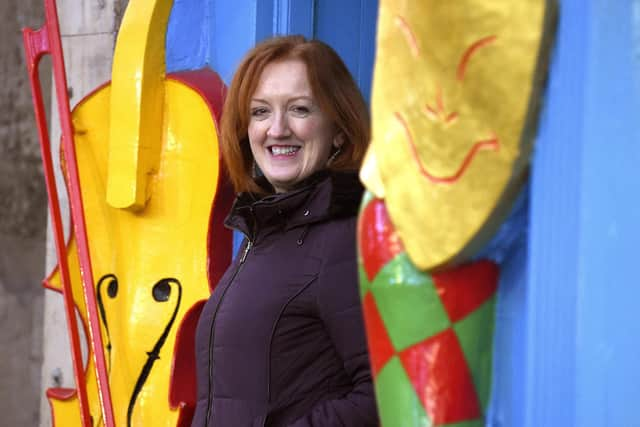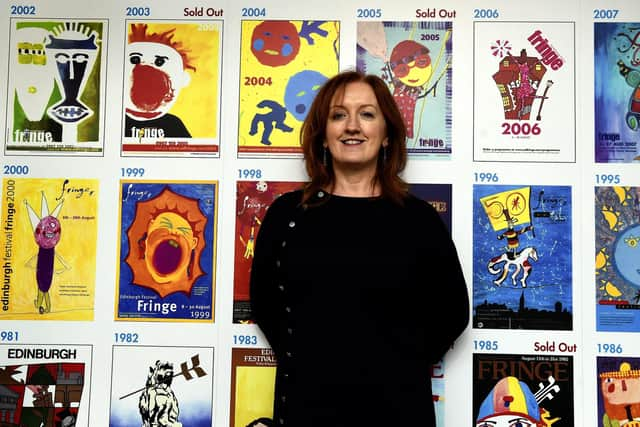Edinburgh Festival Fringe chief insists she will be staying to oversee recovery and transformation
As final preparations are made for the full-scale return of the festival in its 75th anniversary year, Fringe Society chief executive Shona McCarthy urged artists and venues to “hold their nerve” amid reports of slower than normal ticket sales.
She predicted the Fringe’s comeback would be “really successful” with a late surge of bookings from local festivalgoers, but admitted there was “apprehension and nervousness” among participants because of the financial risks involved in staging shows and the additional costs they have faced.
Advertisement
Hide AdAdvertisement
Hide AdMs McCarthy also mounted a robust defence of the charity and its role overseeing the event, after its programme launch was overshadowed by an open letter from performers, producers and venues raising concerns about this year’s festival, including the dropping of the official app.
She said the Fringe Society was essential to uphold the founding principle of the “open access” festival, to ensure there was a “level playing field” for performers and artists, and to retain the “identity” of the event.
Last year’s scaled-back Fringe, which saw planning hampered by Covid restrictions, featured just 542 in-person shows, in comparison to 3841 in 2019.
However this year’s official programme, launched in early July, featured 3171 shows. Registration has been kept open and more than 3400 are on sale on the official website.
Ms McCarthy said: “This time last year I could not have dreamt there would be a Fringe back with the depth of programming and content that we are seeing this year. It is really extraordinary to go through the programme.


"The really exciting thing that struck me when shows started to register was the combination of high-profile artists with so much new work that we’ve not seen before.
“I’m really confident and happy with where we are at at the moment. It’s really hard to compare things with 2019, but we’re tracking exactly where we expected to be.
Advertisement
Hide AdAdvertisement
Hide Ad“Artists and venues pleaded with us to go a month later with the programme to give people more time to register. There’s been a huge demand for programmes and there was a huge spike in ticket sales when they came out.
"I would urge all artists and venues to hold their nerve. All the signs are that audiences are returning and people are booking up.


"From the perspective of the whole Fringe, I think it’s going to be a really successful year. All the anecdotal evidence is pointing towards the positive.
“For some venues, I think success is to sell every single ticket and have every show packed. I think that will be difficult to achieve, but I think it’s going to be a great year.”
Ms McCarthy faced criticism for her response to the open letter – backed by many of the Fringe’s leading venues – after it raised concerns about transparency, poor communication, a lack of action to tackle soaring accommodation costs and the marketing of this year’s event.
She said: “I completely empathise with where people are right now, because our sector has been completely battered.


"There is definitely a level of apprehension and nervousness from people, as this is still a festival where everybody takes an individual risk to be part of it. We take that really seriously.
Advertisement
Hide AdAdvertisement
Hide Ad“I’ve not got a crystal ball. The last two years have been the hardest in my time at the Fringe. But I wouldn’t have stayed if I didn’t believe in this festival and feel that it plays an absolutely vital role in the cultural ecosystem of Edinburgh, Scotland, the UK and internationally. I do see myself helping the Fringe to recover in future.
"I couldn’t be more confident about the new vision and goals for the Fringe that we’ve set out. I’m really looking forward to getting my teeth into working and collaborating with people and for the whole Fringe community making them happen.
"I’m not afraid of criticism. I’m not afraid of people having something to say about the Fringe. I actually think it is a real indicator of how important it is to people. Everybody has an opinion about the Fringe. Criticism definitely goes with the territory. I think people wouldn’t be so vocal and passionate if they didn’t deeply care about this festival.
“The Fringe is also ever-changing. It never stays the same. I love the fact it is dynamic and continues to move, adapt and adjust. But it is like a big dysfunctional family sometimes. I think there is a salve which will come when the Fringe goes live this year."
The open letter criticising the Fringe Society emerged weeks after it had published a new long-term vision for the event, including commitments to tackle rogue venue operators and the exploitation of workers.
Ms McCarthy added: “If there was a need to have a Fringe Society in 1958, when there were only 60 shows, it is hard to imagine that people wouldn’t think there was a need today.
"We have found that the thing that people hold dear most is the founding principle of the Fringe. That’s why our new vision is ‘to give anyone a stage and everyone a seat.’
Advertisement
Hide AdAdvertisement
Hide Ad“If that is really to be held as the thing the Fringe is built upon, I think there needs to be an organisation that upholds the Fringe’s core values so that it can be the best version of itself.
“With an open access platform you need to find ways to make sure it is genuinely open access and it remains a level playing field in some way. “It’s about the whole cultural democracy that underpins it. If you didn’t have it, all you have would be a whole load of disparate pieces all over the place. There would be no shared identity and nothing to pull it all altogether.”
Comments
Want to join the conversation? Please or to comment on this article.
